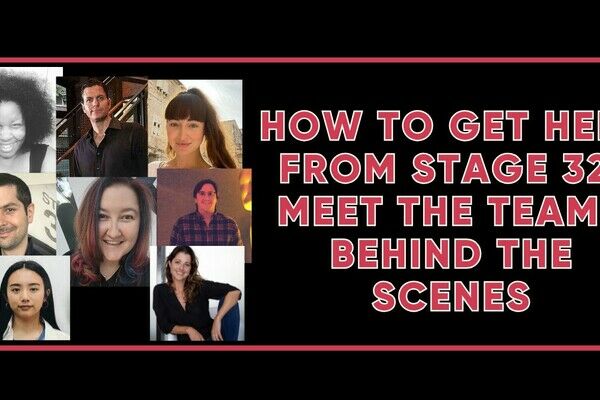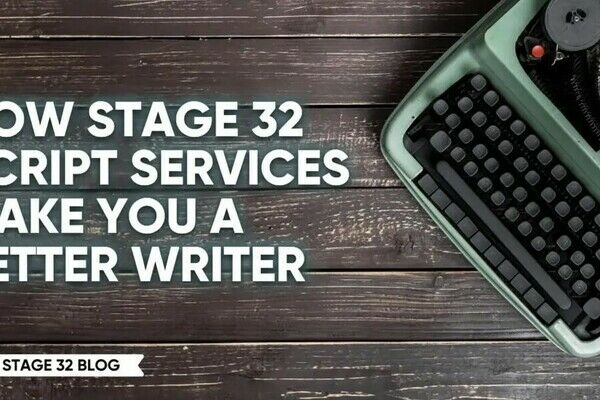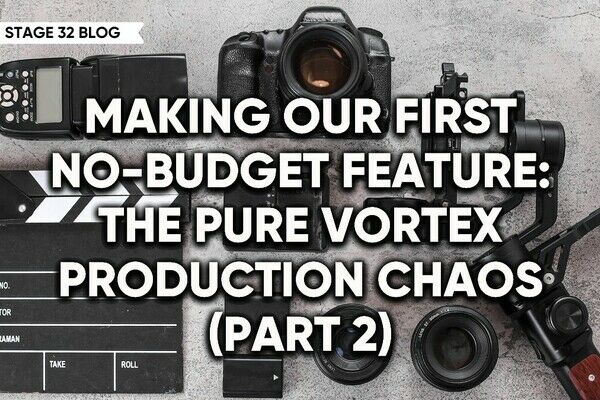The Power of Comps: How They Break (Or Make!) Your TV Pitch
You’re ready to pitch your TV series idea. You’re there, in the room or on Zoom, you’re nervous as hell but you know your stuff, you’ve got this, you draw a deep breath, you say that much-practiced logline and end with “it’s X meets Y!” Someone somewhere told you to use “comps”, so you picked two shows or films that bear some resemblance to your show and put them together. They told you to pick comps that were profitable to show your project will be too, but what does “profitable” even mean in today’s TV landscape? How do you know if a lavish, award-winning production actually made money? Maybe you should pick iconic, TV-history-making shows, even if Breaking Bad or The Office has little to do with your project. Or maybe choosing TV comps is a bad idea altogether because that makes your show sound derivative so picking zeitgeist-y, prestige indie films would be better? But what if few people saw those films? So big studio blockbusters then? Help!
After two decades in the industry, I have heard hundreds of pitches and have been in the room pitching dozens of shows and worked on literally hundreds of written pitch bibles. Here is my radical suggestion based on all that experience: you shouldn’t use comps in your TV pitch at all! I’m serious – they’re nothing but trouble, trust me. OK, maybe they can be a little helpful, in the right place in your pitch (spoiler alert: NOT at the very beginning) with the right thought process behind choosing them, set up to serve a particular purpose.

HOW PITCHING TV SERIES IS DIFFERENT FROM PITCHING FEATURES
The problem is, pitching TV is not the same as pitching a feature at all. In TV you’re not pitching one story, or one pilot, you’re pitching a concept for endless stories, an immersive world, complex characters, and a vision for whole seasons. With so many diverse elements, choosing meaningful comps becomes difficult – are you looking for another show with the same type of concept? The same setting? Similar characters? A similar story to your pilot? And if you find the perfect X meets Y, how do you avoid it sounding like your project is just another tired iteration of an idea that’s been done? The solution is to not use comps at all to describe your show’s concept, world, characters, or story arcs. Pitch YOUR show on YOUR terms, not anyone else’s.

THE CONS: REASONS TO AVOID USING COMPS IN YOUR TV PITCH
With 500+ shows on the air, standing out from the crowd is one of your main challenges in pitching. Comps invite the question, "so how is this different.” If you start your pitch with comps, you’re telling your audience about competing projects even before they’ve heard the details of YOUR idea! One of my most frequent reactions to the trap of “this meets that” right at the top of the pitch is that the show immediately sounds derivative – “meh.” Without hearing about those other shows, I might have considered your show on its own, with its unique elements, not even remembering what else out there might be similar.
My second most frequent reaction isn’t any better: “Wait, what?” Mash-ups of completely different genres and tones are confusing. If you’re pitching “This is A Beautiful Mind meets Desperate Housewives,” I will spend the rest of the pitch trying to figure out what your show actually IS, trying to conjure both those titles like puzzle pieces in my mind while half-listening to what you’re saying. What might be a crystal-clear idea pitched on its own has become muddled, as if perhaps you don’t even know what you want your show to be.
For many years, TV was the ugly stepchild of the glorious feature film. Writers were told to use feature comps to make their shows sound “cinematic,” “prestigious.” Then TV grew up, tackled serious subject matter, produced innovative visuals, recruited genius writers and directors, studded prime-time with A-list stars, and declared its dominance. If you’re still using feature comps for your TV pitches, wake up and smell the streaming! Feature comps make it seem like you’re stuck in that old way of thinking, simply don’t watch any TV, or (maybe worst of all) that you’re trying to reimagine a feature idea for TV without having considered the different requirements of those two media, important things like having a strong story engine, episodic structure, multiple storylines, etc. Plus, many TV execs may not have seen obscure films – we’re too busy binging Bridgerton!

Then there is the trope of using Breaking Bad as a comp for literally Every. Single. Show. No disrespect to the seminal series, but old comps make it seem like you don’t know the current marketplace. Part of using comps is demonstrating your knowledge of the marketplace, right? But that means the TV marketplace NOW, not back in the Obama administration. And as for “profitability” that’s a tricky term in TV. We don’t actually know how profitable some streaming series are. Critical acclaim doesn’t automatically equal profitability, even if it could mean high quality. Some of the most profitable shows of all time are probably those CBS procedurals that still rake in residuals for their staff writers – but that’s not “prestige TV” necessarily. And “big” shows often come with high price tags. In an era of budget contraction, pitching your show as the next “Crown” or “Game of Thrones” is the kiss of death – all your listener hears is $$$ and NOBODY has those kinds of budgets anymore. Finally, if you think using old comps makes your show sound less derivative because those shows have been off the air for a while and remakes are a dime a dozen, think again – it’s hard to forget old shows when everything is on the air somewhere in the streaming universe, and remakes involve getting rights.
All right, message received, ditch comps.
Wait, wait… hang on!
There is one other key element of a series you need to include in your pitch, and that is TONE, the “feel” of your show, its “special sauce.” And describing tone is HARD! It involves a lot of difficult-to-pin-down elements like dark vs. light in terms of adult content and edgy themes, realistic or stylized visual style, music, pacing, humor, narrative devices (think dream sequences, a funny narrator or musical montages), etc. This is where comps can do your heavy lifting!

THE PROS: USING COMPS TO PITCH TONE
Whether you’re pitching verbally in a room or writing a pitch bible, the tone section is the best place to give comps for TONAL / VISUAL comparisons. Don't worry about similar subject matter or story or even world. Focus on a similar type of show or film: format & genre, story engine (aka central conflict), and especially focus on the tone being as similar as possible to what you are going for.
Just to give one general example, a show about a family (real or makeshift) could be similar to:
- Sitcom – small stuff that feels big to the characters, with quips and wisecracks like Young Sheldon or What We Do in the Shadows
- Relationship/communication issues with humor and emotion like This Is Us or Succession or Better Things
- “Armed and dangerous” like Ozark or Animal Kingdom or Peaky Blinders
If you do use comps, it’s also helpful to explain HOW those comps are similar to your show. So instead of “Game of Thrones meets Severence” try, “my show has the ruthless, suspenseful political machinations of the seven kingdoms vying for the Iron Throne set in a modern, sterile, and eerily monotonous setting like the company from Severence.” Highlight elements from your comps that give a feel for the tone of your project, especially in a verbal pitch: “the grittiness of…”, “the sexy soapiness of…”, “the exuberant vibrancy of…”
If you look at written pitch bibles for TV shows, those kinds of references are the only “comps” you will see. Except for my favorite option showcased brilliantly in the Stranger Things pitch - just have posters (I mean the literal publicity posters) of your comps embedded into your pitch, most likely in the tone section. Since you are describing the tone of your show there in your own words, no explanation is even necessary. And there is really no need to limit to two comps; four posters side-by-side might look nice.
Some other advantages of using comps in this way are:
- Since you have described your show in great detail by this point, nobody is thinking of your comps as competing projects or of your show as derivative.
- Since we know these are tonal comps, you can use various shows as long as they are similar in tone to each other without causing confusion about why these comps were selected. The visual style of the posters (hopefully) immediately lets the reader know how they are relevant.
- With multiple tonal comps, using one film comp is absolutely fine – every reader is bound to have seen at least one or two of your picks.

TIPS FOR SELECTING STRONG COMPS
Try your best to use current comps as much as possible. Current to me means either “on the air” now or ended within the past five years.
Make sure some of your comps were either critically acclaimed or received wide viewership, but with multiple comps that doesn’t need to be the case for all of them. A “sleeper hit” with passionate fans can show how a specific tone can catapult a show.
Pay attention to scope and budget, as well as the type of platform your comps aired on. It may be subliminal, but those are the things producers and executives are also thinking about as they consider your comps.
Comps can be a helpful tool in pitching for television - in the right place and in the right way. They are by no means required for a successful pitch, though. All you need for that is passion, confidence, and a strong vision for the show you want to make. Oh, and if you only take one piece of pitching advice from me, it should be this: always take the water!
WANT TO LEARN HOW TO CRAFT YOUR OWN 2-PAGE TV SERIES PITCH FOR FREE?
Pitching your television project isn’t just about having a great idea, it’s about presenting it clearly, concisely, and in a way that grabs the attention of industry professionals who are looking for their next project.
That’s why I’m so excited to invite you to join me for my upcoming FREE Stage 32 Webinar: How to Write a 2-Page Pitch for Your Television Series on Wednesday, April 16th.
In this webinar, I’ll walk you through how to highlight your concept, characters, and series engine in a way that makes executives want to read more. You’ll leave with practical tools to help your pitch stand out in a crowded marketplace, and you’ll even get my personal Pitch Format Cheat Sheet to use as a guide!
Plus, I’ll be answering your questions LIVE, so if you’ve ever wondered what makes a pitch truly memorable, this is your chance to ask.
Click HERE to register, and I’ll see you there!
If you have any questions or need help securing your spot, email the Stage 32 Education Team at Edu@Stage32.com!
Let's hear your thoughts in the comments below!
Got an idea for a post? Or have you collaborated with Stage 32 members to create a project? We'd love to hear about it. Email Ashley at blog@stage32.com and let's get your post published!
Please help support your fellow Stage 32ers by sharing this on social. Check out the social media buttons at the top to share on Instagram @stage32 Twitter @stage32 Facebook @stage32 and LinkedIn @stage-32
| Your 4 Guideposts for Spiraling Upward! |
| Stage 32 Certification Joins Forces with 2025 Made inLimpopo Film Hub Film Symposiums |
Search Stage 32 Blog
There are now 4040 blog posts for you to enjoy. Search them all by tags below.
Acting, Advice, Cinematography, Coffee & Content, Composing, Contests, Distribution, Featured, Filmmaking, Financing, Inspirational, Networking, Producing, Screenwriting, Success Stories, Tips, Trending,Relevant Tags
Recommended Articles

Forbes Spotlights Stage 32 Certification!

How to Get Help from Stage 32: Meet the Teams Behind the Scenes

7 Life Hacks For Creatives

Wearing Many Hats As A Creative

Insider Intel: 2025- Your Year of Breakthroughs (+ What's Coming in 2026)

How Stage 32 Script Services Make You A Better Writer

Making Our First No-Budget Feature: The Pure Vortex Production Chaos (Part 2)

Don't Let the Momentum of November Write Club Die: How to Stay Active Into 2026 & Beyond!

How Modern Franchises Became Our New Religion






